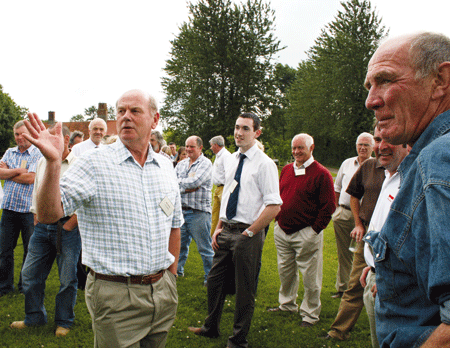Turkey producers urged to enlist butchers in 2008 marketing campaign

Rising costs mean that traditional turkey producers need to work even harder with their butchers in educating consumers why their turkeys are going to cost more this Christmas. That was the main message from the recent Traditional Farmfresh Turkey Association’s annual members’ day.
Speaking to TFTA members, chairman Mick Binder urged them to take their butchers on a guided tour of their farms to show them how their traditional free-range and pole barn-rearing systems contrast with the mainstream, mass-produced product.
“We shall be stressing how different our turkeys are from the mass-produced birds in being slow growing strains taken to maturity, dry plucked and hung for up to 10 days. That is just not done by the big commercial producers and its only right that our butchers should do their bit in getting this message across to their customers,” said Mr Binder, host of this year’s members’ day at Rumburgh Farm, near Halesworth, Suffolk.
Golden Promise
The chairman’s Christmas 2008 campaign will also be targeted on food writers, urging them to spread the good news about the “difference” and pointing out that the association’s Golden Promise brand was protected by an EU Certificate of Specific Character. “The first to be awarded in nearly 10 years ago,” he said.
The chairman’s own plans for Rumborough Farm include the planting of trees in a couple of meadows for the production of woodland flocks in future years. The size of his free range and barn Golden Promise flock will be similar to previous years with 7000 destined for Kelly Turkeys and 3000 sold directly from the farm gate, the latter which he hoped to expand.
It was too early to be precise about costs of production, but they would be up on 2007. “In double figures,” he warned.

Sales and marketing manager Philip Regen of Kelly Turkeys put the year-on-year increase at 20%. He described the Christmas 2008 mood in the Kelly camp as “relatively bullish” on the back of a successful 2007 which saw growth in “all the company’s different routes to market”.
Poult placings were good, as the Kelly butcher customers and the larger retailers were planning for a good Christmas despite the prospect for a major price increase.
“However, judging by feedback from some butchers around the country regarding last year’s experience, they will need more communication from producers on pricing to give them time to educate their customers to the fact that Christmas is going to cost quite a bit more this year,” he said.
Focus on local
Colin Clarke, chief executive of regional food group Tastes of Anglia, advised producers to take advantage of the current focus on local and regional food. It promised to be the dynamic for the next two or three years, but it wouldn’t last for ever, he warned.
Christmas 2008 producers would have to work harder to expand their market and persuade another 1-2% of consumers to choose something with genuine heritage rather than a mass-produced item from the supermarket.
While the whole bird was always going to be the main TFTA product, Mr Clarke stressed that members should not neglect the convenience factor of off-the-bone butterfly wings, saddles and crowns.
De-boned
It could be possible to spread the cost of a de-boning facility among small producer groups, he accepted citing the example of Wicks Manor Pork, a free range pig producer member of Tastes of Anglia.
The Essex-based company had de-boned its way out of the worst of the pig industry’s price crisis with a range of off-the-bone products, retailed at farmers’ markets and farm shops in the county and boosted turnover by £80,000.
Christmas 2008
- Prices set to rise
- Enlist help of butchers
- Consider off-the-bone products
